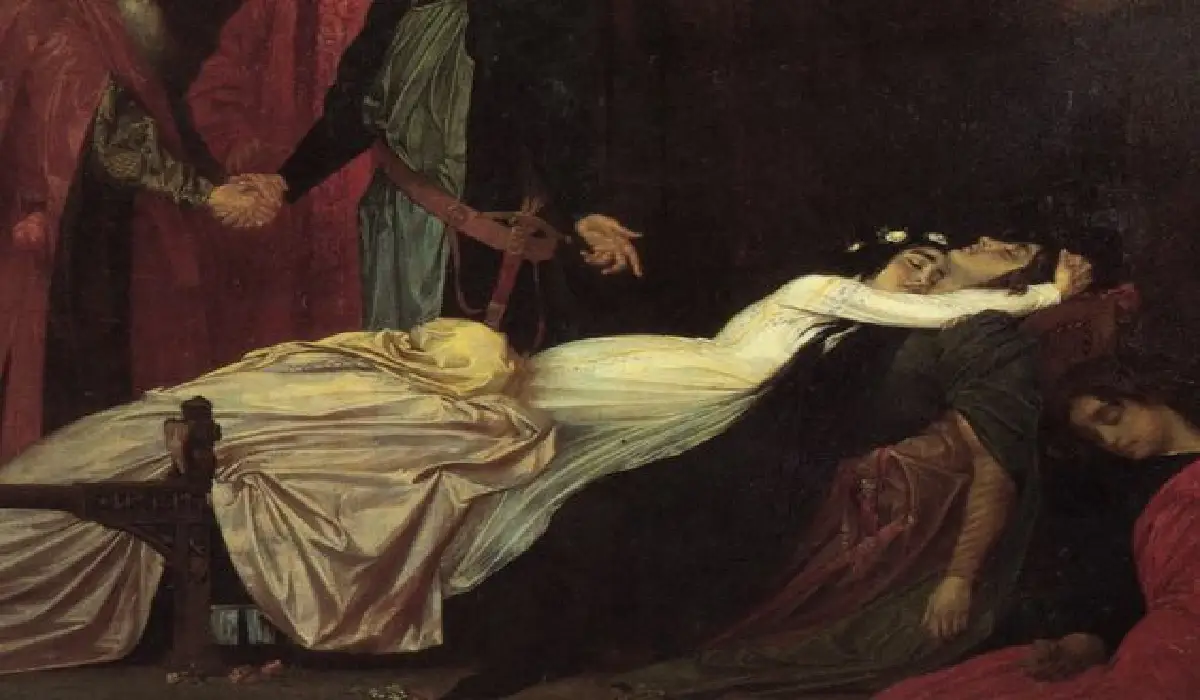
Critic Bertrand Evans rightly points out that “Romeo and Juliet is a tragedy of unawareness”. “Fate, or Heaven”, as the Prince calls it, or the “greater power,” as the Friar calls it, working out its purpose without the use of either a human villain or a supernatural agent sent to intervene in mortal affairs, operates through the common human condition of not knowing. In the Prologue, the Chorus refers to the tragic ending, and both protagonists are described as “star-cross’d lovers. The hate between Capulet and Montague contributes to the flaw related to their tragic story. It also implies that their fate was determined since their birth. From the very beginning of the play, the idea of fate, and the invisible power of malign stars on the lives of main characters is highlighted. It introduces the idea that the lovers are unable to do anything to change the course of events. The Chorus hence introduces us to the main characters and their unfortunate death that will change their parents’ feud. The Chorus’s words “The fearful passage of their death-mark’d ove” gives us the idea that their love is marked by death due to destiny. So, fate and fatalism are present from the initial part of the play to show its inevitability.
The situation of Romeo and Juliet is different than that of other Greek tragedy where god and goddess descent down to wreak vengeance and to baffle the rising event for the cause of humanity. Fate does not appear in person, but the action of the story seems to be in the hands of fate. The characters plan something but the opposite happens. Messages were delayed, plans going wrong and wrong choices were made. The presence of fate is felt in the dramatic premonitions, presents time as a crucial character who bring miseries to the major characters. From the beginning itself, Romeo acknowledges his ill-fate from the beginning itself. Mercutio is slain by Tybalt and Tybalt slain by Romeo who in turn was banished. He slays Tybalt not with the intention of shedding blood. But was forced into that act which further intensified the situation. Like Romeo, Juliet was also aware of fate. She has her own premonitions. The moon is ominous to her. She wishes Romeo not to swear by the moon as moon is variable. Fear lingers in her mind even in the raptures of passionate delight. Juliet bids farewell to Lady Capulet with agony before taking Laurence’s potion. “Farewell: God known when we shall meet him again.
H B Charlton remarks, “Shakespeare give to the action itself a quality apt to conjure the relentless doom. It springs mainly from the impression of time over which the story stretches. All is pressed into three or four days. According to T J B Spenser, “The verbal emphasis is frequently on fate; but the logic of the play seems to be rather more than we should like on chance. This makes the play less satisfying artistically. “Fate is an inevitable force used as a special character, unseen and unheard, but there nonetheless. Each character in the story is aware of fate, and most of all, Romeo has a special relationship with fate. Unfortunate events throughout the play are caused by coincidences. The stars are against Romeo and Juliet, and what happens is coordinated with fate’s cruel plan. It is evident that fate is the cause of their tragic end, and their families’ new beginning. In Shakespeare’s Romeo and Juliet, characters frequently use fate as justification for their actions. The dialogues of the characters in Romeo and Juliet demonstrate that fate is blamed when one wants to get out of an unpleasant situation without consequences, but isn’t believed in when one doesn’t feel threatened. This phenomenon causes disaster - both in real life and in the play. These are few examples of the negative and mysterious force that seems to control the happenings.
During the balcony scene, Juliet hurries Romeo into marriage by constantly questioning his love for her and saying things like, ‘If thy purpose marriage, send me word tomorrow’ (Act 2, scene 1). The Friar’s mistake had a grave effect in the end of this tragedy. He offers to marry Romeo and Juliet, even though he knows there is a huge conflict between the families, probably hoping that the marriage would have solved all the feuds. Moreover, Friar gave Juliet the potion for faking her death, which aggravates things even more. In the balcony scene Juliet hurries because the Nurse is calling her; if Romeo had arrived a few minutes later at the tomb, the tragedy would not have happened; moreover, if the wedding of Juliet and Paris had not been brought forward as quick as that, the letter would have had more time to reach Romeo in Mantua; if the Friar had entered the tomb earlier he could have explained the situation to Romeo and no harm would have happened to anyone.
The terms “Fate” and “Destiny” can easily be confused because they both refer to the path of someone’s life or the inevitable death of a person. So, they are used as synonyms in many contexts. However, there is a slight difference between them, as Destiny can be described as an incident that will necessarily happen in the future to an individual or thing, while fate can be what occurs to an individual or thing in the future, particularly, but in a more negative or final way, implying defeat or death. Destiny is an unknown “power or agency” that is thought to control future incidents, whereas Fate involves the occurrence of events that are predetermined. Consequently, if both destiny and fate are at work, one cannot alter or command the way in which things and events will occur.

